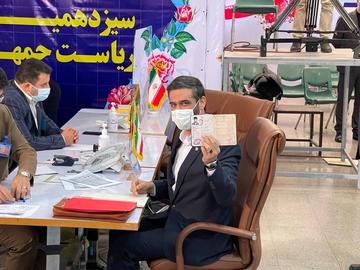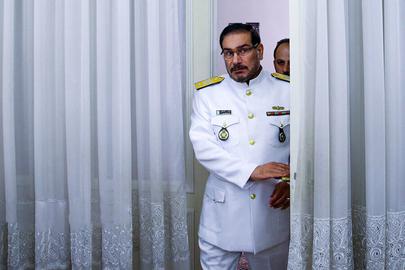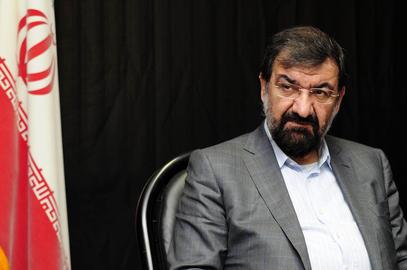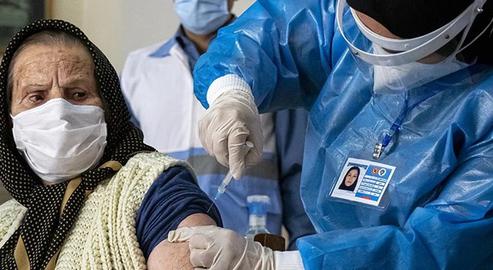On May 11, Iranian media reported that Brigadier General Saeed Mohammad, the former commander of the Revolutionary Guards’ Khatam al-Anbiya Headquarters, had put himself forward as a candidate for the country's 13th presidential election on June 18.
Saeed Mohammad's ambitions to run for president have sparked controversy before, chiefly because they serve as a clear reminder that the Islamic Revolutionary Guard Corps is increasingly playing a role in the top levels of Iranian politics.
Over the last few years, the IRGC and its ever-expanding role in all aspects of Iranian political and public life have been closely documented online and in the media. But in reality, this influence has been building up for decades. The Guards’ involvement in politics has a long, torrid history all its own.
***
In the first presidential election of the Islamic Republic in 1979, Admiral Ahmad Madani, the country's then-Minister of Defense, became the first candidate with a military background to run in a presidential election: a situation that did not occur again until 22 years later.
In the 1997 presidential election, the idea that senior IRGC officer Mohsen Rezaei might run as a candidate was then floated. But in the end, Ayatollah Khamenei did not allow it - perhaps because his preferred candidate at the time was Ali Akbar Nategh Nouri, or because he was still displeased with Mohsen Rezaei's support for Mir Hossein Mousavi during the latter's second term as prime minister.
In 2001, Ali Shamkhani, a former naval commander and defense minister in Mohammad Khatami's government, was nominated to run, followed by Mohsen Rezaei, a former Revolutionary Guards commander, and Mohammad Bagher Ghalibaf, a former Guards commander and police chief. Rezaei withdrew in 2005, but in 2009 and 2013, he remained in the race until the end.
Admiral Ahmad Madani still holds the record for the largest number of votes won by a military man, though Abol Hassan Bani Sadr ended up securing the presidency in 1979. Decades later in his 2013 campaign, Ghalibaf then secured the second-highest number of votes for a military figure in an Iranian presidential election. Before this, in 2005, he had won enough votes to come fourth place.
Overall, in the last 12 presidential elections, four military men have competed in six rounds. But none of them received enough votes to become president.
From Meeting in Kermanshah to Meeting with Rouhani
In Iranian political literature, mention of "military men" in politics, culture and the economy essentially denotes that of the IRGC. Although the Guards have been involved in political rivalries since the beginning of the revolution, it was not until their involvement in the third parliamentary elections in 1988, during the Iran-Iraq war, that this looming presence was recognized as a potential issue.
The IRGC is said to have held a seminar about the elections in Kermanshah around the same time as Faw fell to the Iraqis. In the next election, the Revolutionary Guards’ presence was suddenly more obvious, and commander-in-chief Mohsen Rezaei even demanded that "liberals" be blocked from entering parliament.
The Guards' influence in presidential elections, meanwhile, became more obvious in 2005, as Mehdi Karroubi and Ali Akbar Hashemi Rafsanjani, both candidates that year, and their allies pointed out. Following that election, the IRGC doubled down: members of the Guards came to serve in the Cabinet and eventually made up two thirds of the country's governors, gaining control of various economic and regional projects in the process.
Mohammad Javad Zarif, who was ambassador to the United Nations at the time, drew attention to the issue. He stated plainly that Iran’s Middle East policy under the administration of Mahmoud Ahmadinejad had been taken out of the hands of the Ministry of Foreign Affairs and given straight over to the Guards.
After the 2009 presidential election, leaked comments by Mohammad Ali Jafari, the commander-in-chief of the Revolutionary Guards, and Ali Saeedi, representative of the Supreme Leader to the IRGC, revealed the organization's covert but extensive involvement in the election. Even representatives from Mohsen Rezaei’s presidential campaign told the Supreme Leader that they disapproved of the support that the Basij, the volunteer branch of the Revolutionary Guards, had openly been giving to Ahmadinejad.
By the time the 2013 election came around, the Guards' pervasive presence had become a given. As Ali Saeedi put it a few months before the vote: "The IRGC's inherent duty is to reasonably engineer the elections."
The Leader’s Dream Government
Although the candidates for Iran’s 13th presidential election have not yet been officially nominated, it comes as little surprise that there are a number of would-be candidates with military backgrounds ready to come to the fore.
So far, at least six members of the Revolutionary Guards have implicitly or explicitly declared their intention to run. It remains to be seen to whom the the Guardian Council gives its seal of approval, but the current list includes Mohsen Rezaei, Mohammad Bagher Ghalibaf, Hossein Dehghan, Saeed Mohammad, Rostam Ghasemi, Ali Shamkhani and Alireza Afshar.
The Supreme Leader has consistently spoken about the need for a "young Hezbollahi" government, which has been interpreted by some as a desire for the Revolutionary Guards to head the executive branch. Even before Khamenei first said this, in June 2019 he told students it was important to prepare the ground for a government fashioned on his own ideological visions so that "the sorrows will end."
This prompted fresh debate about the IRGC, its role in elections and its designs on the presidency, with many prominent figures defending the idea of a president drawn from the ranks of the Revolutionary Guards.
The Leader's Succession and JCPOA Negotiations
The 2021 election comes at a very tense time. But social tensions and Covid-19 aside, this would have always been the case because of the Supreme Leader’s advanged age and questions about his health, which are never long out of public discussion.
Iran’s president could well have an influence in determining who the next Leader will be. In addition, the Constitution states that after the death or removal of a Supreme Leader, as the process of bringing in a new Leader gets underway, the duties of the Leader are temporarily carried out by a three-member council, one of whom will be the president.
Many commentators — even among members of Iran's conservative-principlist factions, such as Amir Mohebian — believe the IRGC will have the upper hand in Iran’s power structure after Khamenei dies. At the same time, if relations with the West improve or the US returns to the JCPOA, the principlists and Iran’s military elite will want any successes, however nominal, to be attributed to Iran’s president rather than the so-called reformist camp.
Mohammad Javad Zarif highlighted in December 2020 that some Iranian figures might feel inclined to inform the US of which candidate tthey think would be better-placed to work toward negotiations. Two months later, Mojtaba Zolnouri, head of the parliament's National Security and Foreign Policy Committee, said it would be better if the principlists negotiated with the United States directly, because if an agreement was reached, there would be greater support within the Iranian state for its implementation. It was not clear what, if anything, he thought about which outcome the public might support.
Meanwhile, there are ongoing internal conflicts within Iran’s military, as there are throughout the wider political arena, to the extent that the presidential election of 2021 has been half-jokingly referred to as "an internal election within the Revolutionary Guards".
These disagreements were reflected in disparaging comments made by the Revolutionary Guards' political deputy about Saeed Mohammad as he prepared to put himself forward to run for president. A similar conflict also took place in 2005; while a group of Revolutionary Guards commanders initially supported Ghalibaf, their allegiance eventually shifted to Ahmadinejad.
Given the current situation and conditions, Iran’s 2021 election could be ripe for a military man to win. However, in the last round, there was turbulence up until the very last days before polling day. This time, too, the outcome of the election is likely to be determined only at the close.
Related Coverage:
Has the Regime Decided Low Election Turnout is its New Strategy?
Is it Legal for the Revolutionary Guards to Interfere in Politics?



























comments